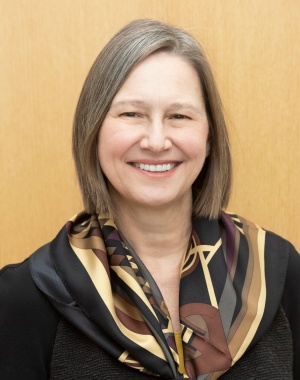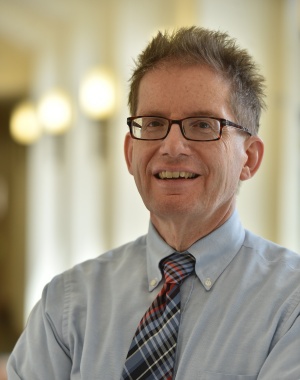
What is the carbon footprint for all of the food the University of Michigan consumes? And how can that footprint be reduced?
That was one of the many study areas the President’s Commission on Carbon Neutrality addressed in its final report, which was delivered to President Schlissel in March. And it was the topic that two Ford School students, Marc Jaruzel (MPP ‘20) and Jaclyn Kahn (MPP ‘21), addressed through student advisory panels.
The commission was tasked with helping the university achieve net-zero greenhouse gas emissions across all three campuses, and its report included 50 recommendations which U-M could take, including emissions from on-campus sources like the central power plant, emissions resulting from purchased electricity, and emissions resulting from indirect sources like commuting, food procurement and university-sponsored travel.
The Ford School students were among 50 who participated throughout the process, which took over two years to complete.
Jaruzel was in a class about Sustainable Food Systems at the School for Environment and Sustainability (SEAS) with researchers Leslie Hoey (from the Taubman School of Architecture and Urban Planning) and Andrew Jones (School of Public Health) when he heard about the student panels. He signed up right away and became part of the internal analysis team.
“The first step was to determine how much carbon was coming out of the food system. It actually turned out to be the biggest challenge we faced, because the U-M food system is very diverse. M-Dining makes up most of it, but there are so many tangents that run off. So we had to track down the structure of all these restaurants and where all the food is coming from,” he says.
The group looked at the carbon footprint of the M-Dining supply chains and extrapolated those results across the whole system based on expenditure. Working with the faculty researchers, they met with M-Dining over breakfast and dinner (pre-COVID). “So we were the best group, because we got free food as well,” he says.
During the comment phase, Kahn advocated for the need to explain, expand, and standardize composting policies and procedures in order to increase uptake and understanding by all involved: staff, professors, students, and outside environmental companies.
“I wanted to do this because I wanted to advocate for better waste management policies at the University and make it a more sustainable place. As the Sustainability Chair with the Ford School's Environmental Policy Association, I led the charge to bring a compost bin to Ford for student use. In seeing how challenging yet rewarding this process was, I thought being a part of the Commission would allow me to lend my experience as well as allow me to bring about larger-scale change,” she says.
Her work in the field continues. She is doing research with Ford School professor Barry Rabe, focusing on food waste reduction, compost encouragement and broadly landfill methane mitigation policies. In the fall semester she did an overview of all 50 states, and currently is looking at the Canadian provinces.
Jaruzel says their recommendations were pretty simple. ”First we call for more transparency and data, based on where the supplies are originating. We settled on other generic advice: eat less red meat and compost more. And also getting rid of trays, because you are less likely to waste food if you just have one plate at a time.You can have as much food as you want, but at least the action of having to walk back to get more reduces food waste.”
“These solutions are simple to an extent. Implementing those things is not so easy. In terms of trying to change people’s diets and habits, it’s hard to ask people to make these changes, but the small changes we can influence together add up to something bigger.”
As Jennifer Haverkamp, commission co-chair, Graham Family Director of the Graham Sustainability Institute and professor of practice at the Ford School said as the report was being released, “Ultimately, the commission’s recommendations should accommodate the needs and lived experiences of those in the U-M community.”
Jaruzel concludes, “It was a great experience because that is the kind of climate-related work that I am pursuing. As we move to electric cars and transportation and we use clean energy for the electricity system, the next big thing is agriculture. It is not currently getting the attention it deserves, but in the next 10-15 years you’ll be hearing a lot more about food.”

